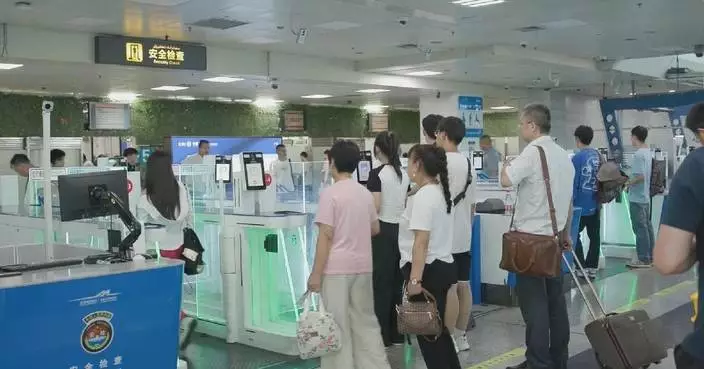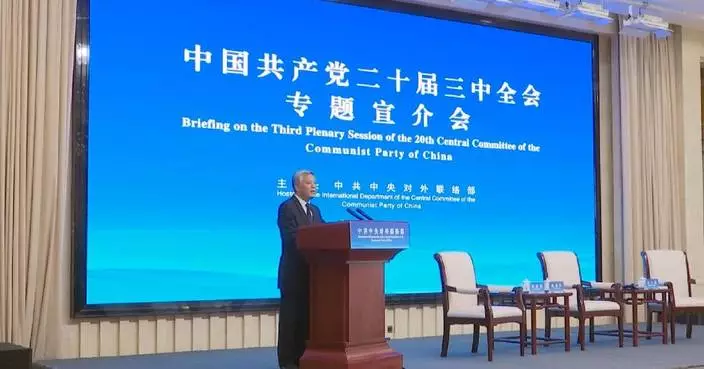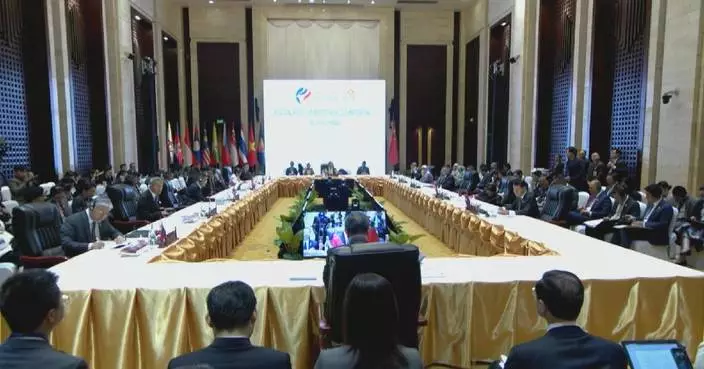Torrential rain hit south China's Guangdong Province on Saturday, raising water level of several rivers, stranding people, and disrupting traffic and railway services. Beijiang River in the Pearl River basin experienced its second flood of the year on Saturday evening due to the heavy rainfall. In response, the Pearl River committee of the Water Resources Ministry has upgraded the emergency response for flood control from level-IV to level-III. As the heavy rainfall is expected to continue, the provincial flood control and drought relief headquarters decided to raise the emergency response for flood control and prevention work from level-III to level-II from 18:00 Saturday.
China has a four-tier flood-control emergency response system, with Level I being the most severe response.
The heavy rainfall has also caused reservoir levels to rise. The water flow at Feilaixia hydrological station in Qingyuan City is expected to rise to 17,000 cubic meters per second on Monday, three meters above the alarm level. In preemptive actions, reservoirs in the province were opened to discharge water, aiming to reduce pressure and mitigate potential flooding. On Saturday, the sustained heavy rainfall in Qingyuan led to flooding in some low-lying areas, stranding residents in their homes. Some houses were half-submerged by flood waters. Emergency responders utilized inflatable boats to reach the stranded residents and transfer 20 affected people to safety. A sudden downpour hit urban areas of Guangzhou, the provincial capital, on Saturday afternoon, causing waterlogging on the streets. The local government has raised its emergency response level for rainstorms to level-II and activated a level-II emergency response for rainstorm and waterlogging prevention. By night, the rainfall noticeably subsided, and the emergency response has been lifted. Affected by the heavy rain, some trains on the Beijing-Guangzhou route through Shaoguan City in northern Guangdong were canceled or rerouted, leaving many passengers stranded. The railway authorities quickly organized shuttle buses to transport affected passengers. A total of 3,478 passengers had been ferried to other railway stations by Saturday noon.

Heavy rain hits Guangdong, triggering emergency response
On his second official visit to China, Prime Minister of the Republic of Vanuatu Charlot Salwai expressed admiration for China's remarkable ability to balance preserving its cultural heritage with embracing innovative transformation.
Salwai paid an official visit to China from July 7 to 12. During his trip, he toured the southern province of Guangdong and explored the megacities of Beijing and Shanghai. His visit included tours of high-tech companies, a ride on a high-speed train, and a performance of traditional Cantonese opera.
In an interview with China Central Television Network (CCTV) aired on Friday, Salwai recounted his journey starting with a warm welcome that included enjoying Beijing Roast Duck, also known as Peking Duck -- a culinary delight introduced to him by the Chinese ambassador in Vanuatu.
"Many had to say. Peking Duck. Because we had it here on our arrival, so it was very tasty. And I understand that the Chinese ambassador in Vanuatu brought us to one of the traditional restaurants, small but beautiful," he said. The prime minister sees China's preservation of its culture as a vital lesson in understanding one's roots and the journey to the present day, acknowledging China's efforts to integrate cultural preservation with modernization.
"It's going to be my second official visit to China. I'm always impressed to see big changes and especially innovations made by China and especially the cities. Because a big impression is to see how China continues to maintain and keep its culture. Because I think it's the basis of everything -- to know where you come from and to understand where we are today. I feel that China is doing a lot to maintain its culture, but at the same time, doing, innovating to transform its culture,” Salwai said.
He also emphasized the importance of learning from China's sustainable development strategies.
"Today, it comes from a long way, some hardship, the government, and also the people of China. So, I'm impressed to see what is done, especially how China associates infrastructure development with nature. That's meant to keep, continue to keep the environment. It takes effort with the climate change by maintaining the ecosystem. I think it's something that, for a small country like Vanuatu, is important to learn. So, we are here. I'm here with my delegation to learn," Salwai said.

Vanuatu's PM commends China's cultural preservation, innovation amid fast growth











